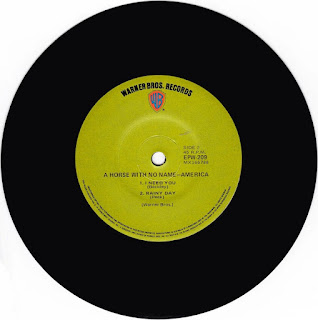"A Horse with No Name" is a song by the folk rock band America, written by Dewey Bunnell. It was the band's first and most successful single, released in late 1971 in Europe and early 1972 in the United States, and topped the charts in Canada, Finland, and the United States. It was certified gold by the Recording Industry Association of America.
America's self-titled debut album was released initially in Europe, without "A Horse with No Name", and achieved only moderate success. Originally called "Desert Song", "Horse" was written while the band was staying at the home studio of musician Arthur Brown, near Puddletown, Dorset, England. The first two demos were recorded there, by Jeff Dexter and Dennis Elliott, and were intended to capture the feel of the hot, dry desert that had been depicted at the studio from a Salvador Dalí painting, and the strange horse that had ridden out of an M. C. Escher picture. Writer Dewey Bunnell also says he remembered his childhood travels through the Arizona and New Mexico desert when his family lived at Vandenberg Air Force Base. Bunnell has explained that "A Horse with No Name" was "a metaphor for a vehicle to get away from life's confusion into a quiet, peaceful place".
Trying to find a song that would be popular in both the United States and Europe, Warner Brothers was reluctant to release Gerry Beckley's "I Need You" ballad as the first single from America. The label asked the band if it had any other material, then arranged for America to record four more songs at Morgan Studios, Willesden in London. "A Horse with No Name" was released as the featured song on a three-track single in the UK, Ireland, France, Italy and the Netherlands in late 1971. On the release, "A Horse with No Name" shared the A-side with "Everyone I Meet Is from California"; "Sandman" featured on the B-side. However, its early-1972 two-track US release did not include "Sandman", with "Everyone I Meet Is from California" appearing on the B-side.
Despite the song being banned by some U.S. radio stations, in Kansas City and elsewhere, because of supposed drug references to heroin use ("horse" is a common slang term for heroin), the song ascended to number one on the U.S. Billboard Hot 100, and the album quickly reached platinum status. The song charted earlier in Ireland (reaching number 4), the Netherlands (reaching number 11) and the UK (reaching number 3, the band's only Top 40 hit in the country) than it did in the United States.
The song's resemblance to some of Neil Young's work aroused some controversy. For example, in their review of "A Horse with No Name" Cash Box described America as "CSN&Y soundalikes." "I know that virtually everyone, on first hearing, assumed it was Neil", Bunnell said. "I never fully shied away from the fact that I was inspired by him. I think it's in the structure of the song as much as in the tone of his voice. It did hurt a little, because we got some pretty bad backlash. I've always attributed it more to people protecting their own heroes more than attacking me." By coincidence, it was "A Horse with No Name" that replaced Young's "Heart of Gold" at the number 1 spot on the U.S. pop chart.
The single achieved sales of over 50,000 copies in Australia, being eligible for the award of a gold disc.
The song has received criticism for its lyrics, including "The heat was hot"; "There were plants, and birds, and rocks, and things"; and "'Cause there ain't no one for to give you no pain." Singer-songwriter Randy Newman dismissed "A Horse With No Name", saying that it sounds like it's "about a kid who thinks he’s taken acid."
Penn Jillette asked the band about their lyrics, "there were plants, and birds, and rocks, and things" after a show in Atlantic City, where America opened for Penn & Teller. According to Jillette, their explanation for the lyrics was that they were intoxicated with cannabis while writing it. In a 2012 interview, Beckley disputed Jillette's story, saying, "I don't think Dew was stoned."




No hay comentarios.:
Publicar un comentario